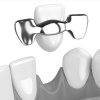Bleeding Gums
When your brush or floss your teeth and see you have bleeding gums it can definitely be very scary but your Springfield dentist can easily treat this common problem. In most cases gums that bleed, are sore or swollen are a sign of gum disease, but there are other reasons this occurs.
What Causes Bleeding Gums? 
Your Springfield dentist can help explain why your gums are bleeding. Here are the most common causes of this condition:
- How you brush your teeth – Although the gums are very resilient, the tissue is very delicate and if you brush your teeth too hard or too frequently it can damage your gums.
- How you floss – Do not force the floss around and between your teeth. Use a gentle saw-like motion and follow the curve of the tooth.
- Gum Disease – More than 75 percent of all Americans over 35 years of age experience some form of gum disease. If you catch it in the early stages, gum disease can be halted and reversed but the longer you allow it to continue the odds increase you will develop advanced stages of the disease that will cause future problems.
- Canker Sores – Also known as mouth ulcers these painful sores can develop anywhere in your mouth and if are on the gums can make them bleed. Scientists still do not what exactly causes these sores but it is thought to be an autoimmune response by the body.
- Chemotherapy – Unfortunately, this treatment for cancer can have many side effects. One of the most common is the development of ulcers and sores in the mouth and on the gums.
- Tobacco Products – People who smoke or chew tobacco are far more likely to develop gum problems.
- Hormones – Men have hormone fluctuations throughout their life, but not like women. Many females experience problems with their gums during pregnancy, puberty and menopause due to the rise and fall of their hormone levels.
What Your Springfield Dentist Can Do to Help Bleeding Gums
A proper oral health regimen and balanced diet certainly help ward off dental issues. Not only can your Springfield dentist educate you on how to brush and floss properly, there are other things that can be done so your gums will not bleed:
Medicated mouthwash. This can help kill the bacteria in your mouth that are contributing to the condition.
Prescription medication. Antibiotics help rid the mouth of any infection.
Deep cleaning. A cleaning below the gumline will remove bacteria and any other debris to restore healthy gum function.



